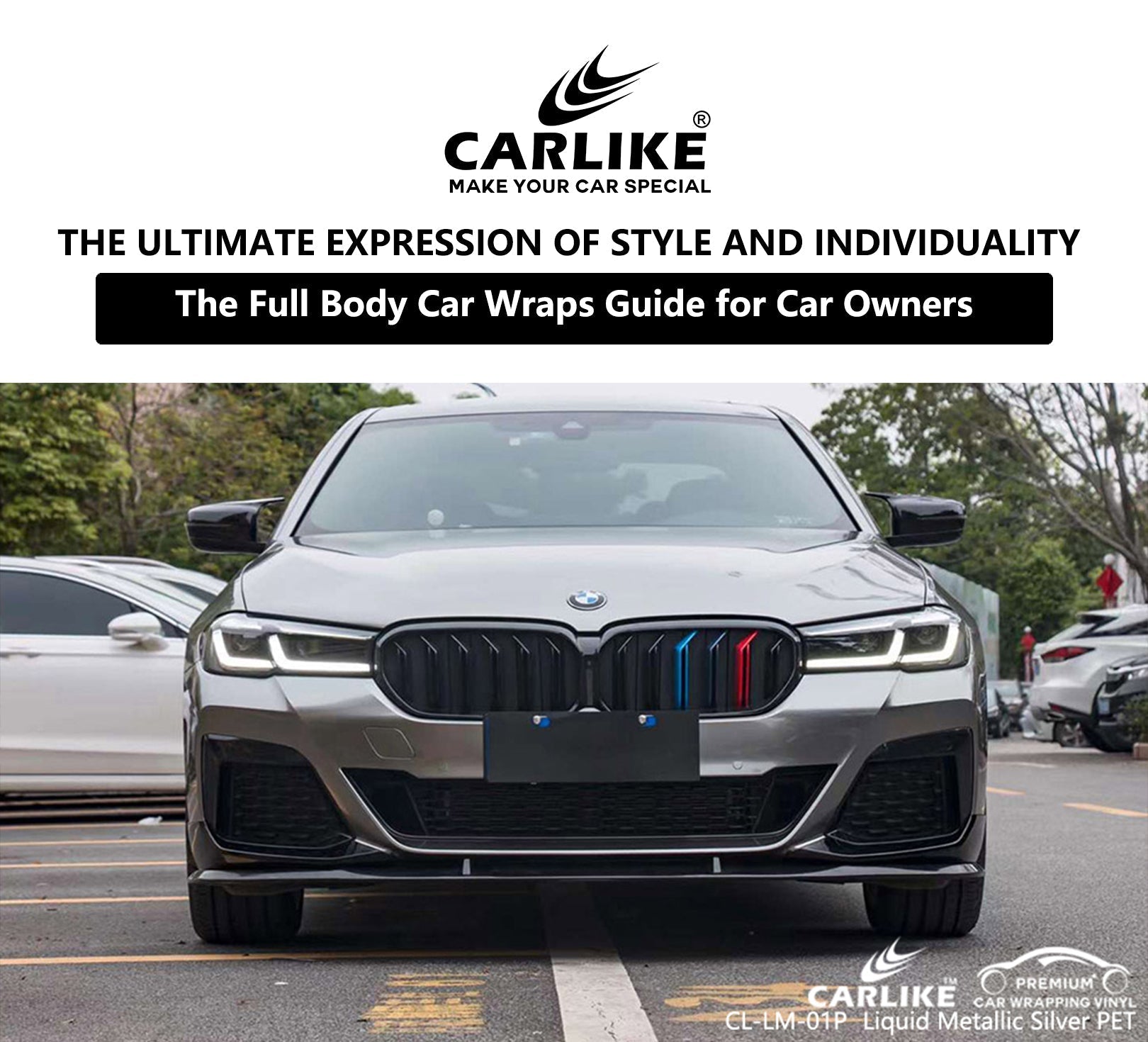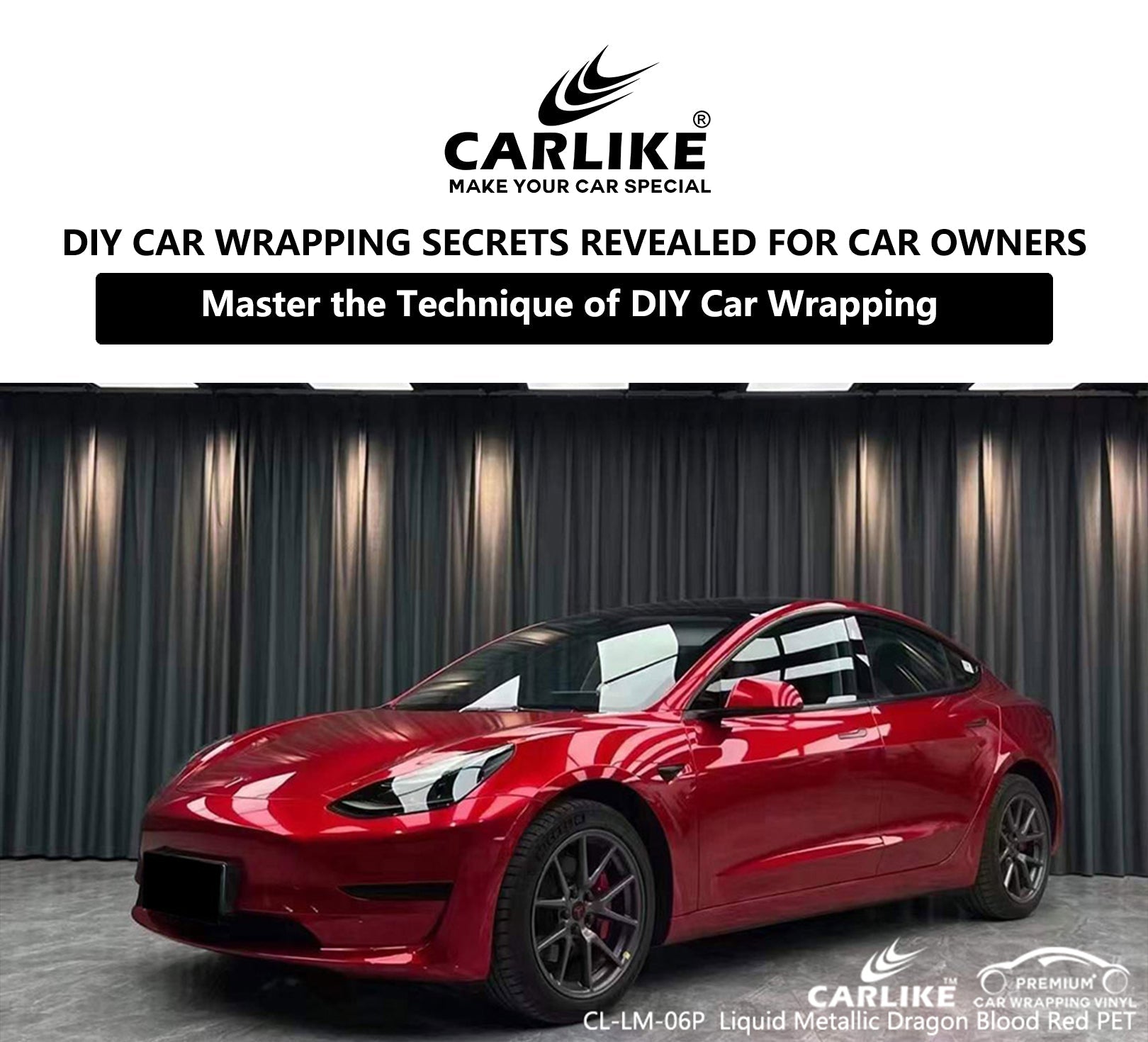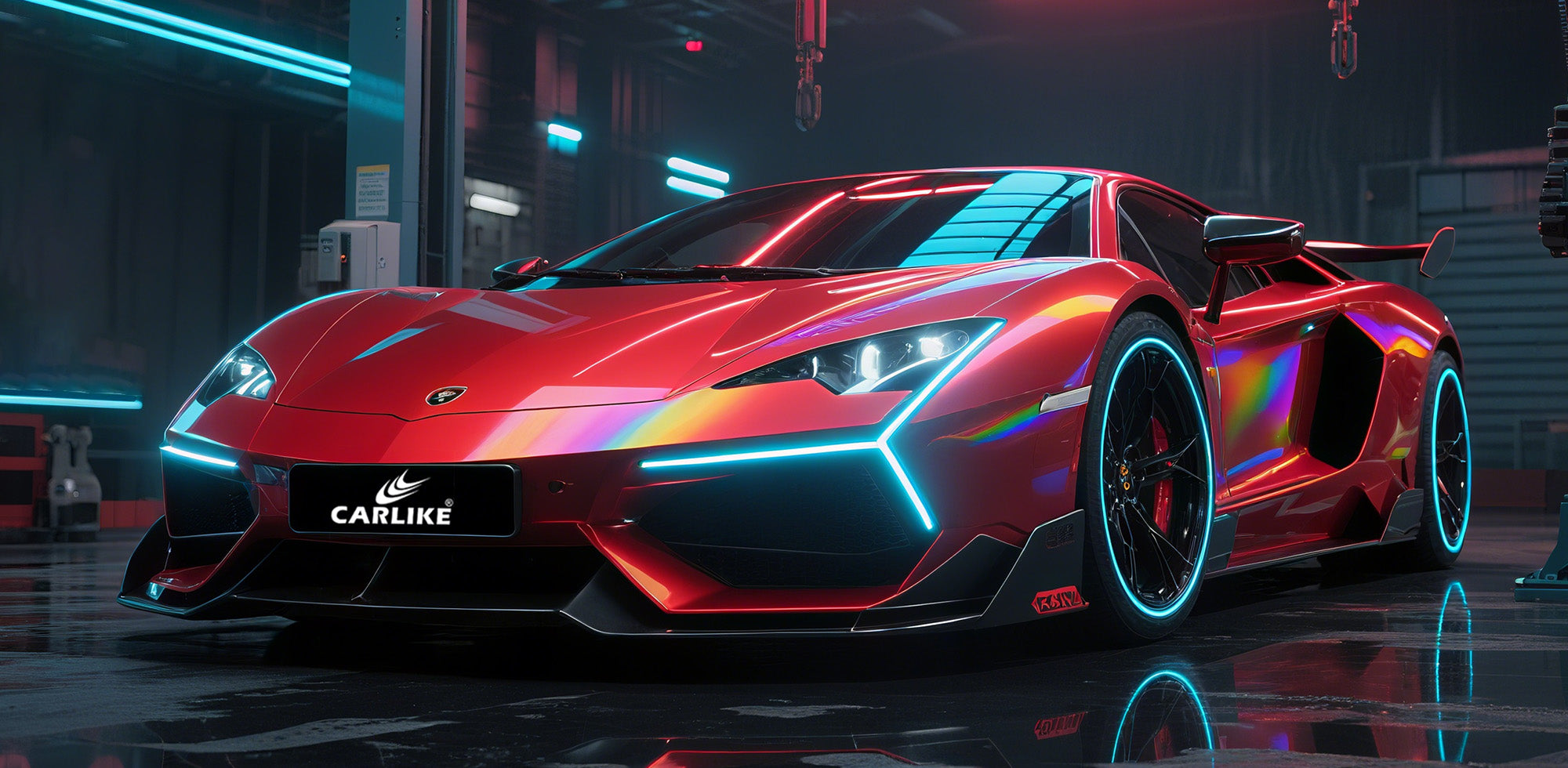Factors Affecting the Lifespan of Car Wraps
The lifespan of car wraps can vary depending on several factors. Understanding these factors can help car owners make informed decisions when choosing a wrap and taking care of it. Here is a detailed explanation of the factors that affect the lifespan of car wraps:
1. Quality of Materials: The quality of the materials used in the car wrap plays a significant role in its longevity. High-quality vinyl films with superior adhesive properties tend to last longer than lower-quality alternatives. When selecting a car wrap, it's essential to choose a reputable brand or supplier that offers durable and reliable materials.
2. Installation Technique: Proper installation is crucial for the longevity of a car wrap. It requires skill, experience, and attention to detail. An improperly installed wrap can lead to premature peeling, bubbling, or lifting at the edges. Professional installation by experienced installers ensures that the wrap adheres smoothly and uniformly to the vehicle's surface, maximizing its lifespan.
3. Environmental Factors: Environmental conditions can impact the durability of a car wrap. Exposure to extreme temperatures, excessive sunlight, humidity, or harsh chemicals can accelerate the wear and tear of the wrap. UV rays can cause fading and discoloration over time. Additionally, regions with harsh winters, road salt, or abrasive debris can also affect the wrap's lifespan. Taking these factors into account is important when considering how long a wrap will last in a particular climate or location.

4. Maintenance and Care: Proper maintenance and care significantly contribute to the longevity of car wraps. Regular cleaning using recommended products and techniques helps prevent dirt, grime, and contaminants from building up and causing damage. Avoid using abrasive materials or harsh chemicals that can compromise the integrity of the wrap. Additionally, parking in shaded areas or using car covers can provide protection from direct sunlight and environmental elements, extending the lifespan of the wrap.
5. Driving Habits: The way a vehicle is driven can impact the wear and tear on the car wrap. Aggressive driving, high-speeds, off-road adventures, or rough handling can subject the wrap to increased stress, increasing the likelihood of damage. Adopting safe and cautious driving practices can help preserve the wrap's condition and longevity.
6. Brand and Product Variation: Not all car wraps are created equal. Different brands and product lines offer varying levels of quality, durability, and warranties. Some wraps may be specifically designed for long-term use, while others are intended for shorter durations. Researching and selecting a reputable brand known for producing durable wraps can help ensure a longer lifespan.
7. Overall Condition of the Vehicle: The condition of the vehicle's surface prior to installing the wrap can affect its lifespan. Ideally, the surface should be smooth, clean, and free of any rust, dents, or imperfections. Proper preparation and surface treatment ensure optimal adhesion and reduce the risk of the wrap lifting or peeling prematurely.
By considering these factors and making informed decisions, car owners can maximize the lifespan of their wraps. It's important to consult with professionals in the industry, follow manufacturer guidelines, and invest in high-quality materials to ensure a long-lasting and visually appealing car wrap.
Different Types of Car Wraps and Their Durability
When it comes to car wraps, there are various types available in the market, each with its own unique characteristics and durability. Understanding the different types of car wraps and their durability is essential for car enthusiasts and owners looking to enhance the appearance and protect the surface of their vehicles. Let's explore some of the common types of car wraps and their respective durability levels.
1. Vinyl Wraps: Vinyl wraps are the most popular type of car wraps due to their versatility and durability. They are typically made of a thin layer of vinyl material that adheres to the surface of the vehicle. Vinyl wraps come in different grades, such as calendared and cast vinyl. Cast vinyl is generally considered more durable as it is designed to conform to complex curves and contours of the car's body, providing better longevity and resistance to fading, cracking, and peeling. It can last anywhere from 5 to 10 years, depending on various factors like maintenance, climate, and installation quality.
2. Matte Wraps: Matte wraps have gained significant popularity in recent years due to their sleek and non-reflective appearance. These wraps have a flat finish that gives the vehicle a distinct and modern look. The durability of matte wraps is comparable to their vinyl counterparts. However, matte finishes are generally more susceptible to showing scratches and imperfections, so proper care and maintenance are crucial to preserve their longevity.

3. Satin Wraps: Satin wraps are similar to matte wraps but have a slightly glossier finish. They offer a balance between the sleekness of matte and the shine of glossy wraps. In terms of durability, satin wraps typically perform similar to vinyl wraps, providing good resistance against UV rays, scratches, and weather elements.
4. Glossy Wraps: Glossy wraps provide a high-shine, reflective finish, similar to a fresh coat of paint. These wraps are eye-catching and can enhance the aesthetics of a vehicle. In terms of durability, glossy wraps are generally on par with vinyl wraps, offering good resistance against fading, weathering, and minor scratches.
5. Chrome Wraps: Chrome wraps are known for their mirror-like, reflective finish that can give a vehicle a distinctive and attention-grabbing appearance. However, chrome wraps are usually less durable than other types of wraps. They are more prone to showing scratches, swirl marks, and imperfections, and their longevity may be shorter compared to other options. Chrome wraps require extra care and maintenance to keep them looking their best.
It's important to note that the durability of car wraps is influenced by several factors, including the quality of the materials used, the skill of the installer, the climate and weather conditions the vehicle is exposed to, and the owner's maintenance practices. Regular washing, using non-abrasive cleaning methods, and avoiding harsh chemicals or abrasive materials can significantly extend the lifespan of any car wrap.
In summary, different types of car wraps offer varying levels of durability. Vinyl wraps, especially cast vinyl, tend to be the most durable option, while matte, satin, glossy, and chrome wraps may have slightly different durability characteristics. It's crucial to choose a high-quality wrap, have it professionally installed, and follow proper maintenance practices to ensure the longevity of the car wrap and keep your vehicle looking stylish and protected for years to come.
Maintenance Tips to Extend the Life of Your Car Wrap
A car wrap is a fantastic way to enhance the appearance of your vehicle, protect its original paintwork, and make a bold statement on the road. To ensure that your car wrap maintains its vibrant colors and pristine condition for as long as possible, proper maintenance is crucial. By following some simple maintenance tips, you can extend the life of your car wrap and enjoy its benefits for years to come.
1. Regular Washing: Regularly washing your car wrap is essential to prevent the buildup of dirt, dust, and contaminants that can degrade the wrap's appearance over time. Use a mild automotive detergent or specifically formulated wrap cleaner, along with a soft microfiber cloth or sponge, to gently wash the surface of the wrap. Avoid using abrasive materials, such as brushes or rough sponges, as they can cause scratches.
2. Hand Drying: After washing your car wrap, it's important to hand dry it using a clean microfiber cloth or chamois. This prevents water spots and streaks from forming on the wrap's surface, ensuring a clean and polished look. Avoid air drying, especially in direct sunlight, as it can lead to water spots and uneven drying.
3. Avoid High-Pressure Washing: While car wraps are designed to withstand various weather conditions, it's best to avoid high-pressure washing systems, such as automatic car washes. These machines often use high-pressure jets and harsh chemicals that can damage the wrap and cause it to peel or fade prematurely. Opt for hand washing or touchless car washes instead.
4. Use Protective Products: To provide an extra layer of protection for your car wrap, consider using a quality spray-on wax or sealant designed for vinyl wraps. These products help to shield the wrap from UV rays, pollutants, and minor scratches. Apply them as recommended by the manufacturer, ensuring an even and thin layer for optimal protection.

5. Park in Shade: Excessive exposure to the sun's UV rays can cause the colors of your car wrap to fade over time. Whenever possible, park your vehicle in shaded areas, such as covered parking or under trees. If shade is not available, consider using a car cover specifically designed for wraps to shield your vehicle from direct sunlight.
6. Avoid Harsh Chemicals: When cleaning your car wrap, avoid using harsh chemicals, solvents, or abrasive cleaners. These substances can damage the wrap's surface, causing discoloration or even peeling. Instead, stick to mild cleaning solutions and products specifically formulated for car wraps to ensure their longevity.
7. Handle with Care: Be mindful of how you handle your car wrap to prevent accidental damage. Avoid scraping or scratching the surface with sharp objects, such as ice scrapers or keys. Additionally, exercise caution when fueling your vehicle to avoid spills or drips on the wrap, as some fuel types can cause staining or damage.
8. Regular Inspections: Perform regular visual inspections of your car wrap to identify any signs of damage, such as peeling, bubbling, or lifting edges. Addressing these issues promptly can prevent further damage and ensure the longevity of your wrap. If you notice any problems, consult a professional wrap installer for guidance on repair or replacement.
By following these maintenance tips, you can significantly extend the life of your car wrap and keep it looking vibrant and pristine. Remember, proper care and attention are key to preserving the beauty and longevity of your car wrap investment.
Signs That Your Car Wrap Needs Replacement
As a car owner who has invested in a vibrant and stylish car wrap, it's essential to be aware of signs that indicate when it's time for a replacement. While high-quality car wraps are designed to be durable and long-lasting, they are not immune to wear and tear over time. Here are some crucial signs that your car wrap needs replacement:
1. Fading and Discoloration: Car wraps are exposed to the elements, including sunlight, rain, and pollution. Over time, UV rays can cause the colors of the wrap to fade and lose their original vibrancy. If you notice significant fading or discoloration, it's a clear sign that the wrap's protective layer may be compromised and that it's time for a replacement.
2. Cracks and Tears: The surface of your car wrap should be smooth and free of any cracks or tears. If you notice any signs of damage, such as small fissures or tears in the material, it can allow moisture to seep in and damage the underlying paint or body of your car. Addressing these issues promptly is crucial to preventing further damage and ensuring your car's overall appearance.
3. Bubbles and Wrinkles: Proper installation is crucial for the longevity of a car wrap. If you start noticing bubbles or wrinkles on the surface of the wrap, it's a sign of poor installation or that the adhesive is failing. Bubbles can trap dirt and moisture, leading to more significant issues over time, and wrinkles can compromise the overall aesthetic of the wrap.

4. Peeling Edges: Over time, the edges of the car wrap may start to lift or peel away from the car's surface. This can occur due to poor installation, exposure to harsh weather conditions, or the natural wear and tear of the material. Peeling edges not only look unsightly but can also lead to further damage if left unaddressed.
5. Stains and Difficult Cleaning: Car wraps should be relatively easy to clean, but as they age, they may become more challenging to maintain. Stubborn stains that resist cleaning or require abrasive methods may indicate that the protective layer of the wrap is compromised, and it's time to consider a replacement.
6. Visible Wear in High-Traffic Areas: Certain parts of your car, such as door handles, side mirrors, and bumpers, are more prone to wear due to frequent contact. If you notice significant wear or damage in these high-traffic areas, it's a sign that the wrap's protective layer is no longer providing adequate protection.
7. Loss of Gloss or Sheen: A high-quality car wrap should have a glossy and polished appearance. If you notice a loss of gloss or sheen in the wrap, it could be an indication of aging and potential damage to the outer layer. This loss of shine can make your car look dull and less attractive.
In conclusion, being attentive to these signs is crucial in determining when your car wrap needs replacement. Regular maintenance, proper care, and addressing issues promptly can help extend the life of your car wrap, but eventually, even the best wraps will need to be replaced to maintain the aesthetic appeal and protection of your beloved car.
FAQ for how long does wrap last on a car?
Q: How long does a car wrap typically last?
A: The lifespan of a car wrap depends on various factors such as the quality of the materials used, the installation process, and how well it is maintained. On average, a professionally installed car wrap can last between 5 to 7 years.
Q: Do different types of car wraps have varying lifespans?
A: Yes, the type of car wrap can impact its longevity. Vinyl wraps are commonly used and can last several years with proper care. However, specialty wraps like chrome or metallic finishes may have a shorter lifespan due to their unique characteristics.
Q: Does the color of the car wrap affect its durability?
A: In general, the color of the car wrap does not significantly impact its durability. However, darker-colored wraps may show signs of fading more visibly compared to lighter-colored wraps.
Q: How can I extend the lifespan of my car wrap?
A: Regular maintenance is key to prolonging the lifespan of your car wrap. This includes hand washing instead of using automated car washes, avoiding abrasive cleaners, parking in shaded areas, and using a protective sealant. Additionally, addressing any issues promptly, such as repairing small tears or bubbles, can help prevent further damage.
Q: Can weather conditions affect the longevity of a car wrap?
A: Yes, extreme weather conditions, especially prolonged exposure to intense sunlight, can impact the lifespan of a car wrap. Excessive heat, UV rays, and harsh winter conditions can accelerate the deterioration of the wrap. Consider parking in covered areas or using a car cover if your vehicle will be exposed to extreme weather for an extended period.
Final Words
In conclusion, understanding the longevity of car wrap solutions is essential for car lovers seeking to maintain the beauty and protection of their vehicles. By exploring factors such as the quality of materials, installation techniques, and proper maintenance, you can ensure that your car wrap stands the test of time. Regular care, addressing any issues promptly, and being mindful of environmental factors can extend the lifespan of your car wrap.
Remember, when signs of wear and deterioration become evident, it's crucial to consider a replacement to preserve the stunning appearance of your cherished ride. With the right knowledge and attention, you can enjoy the benefits of wraps that last, enhancing the style and allure of your car for years to come.









